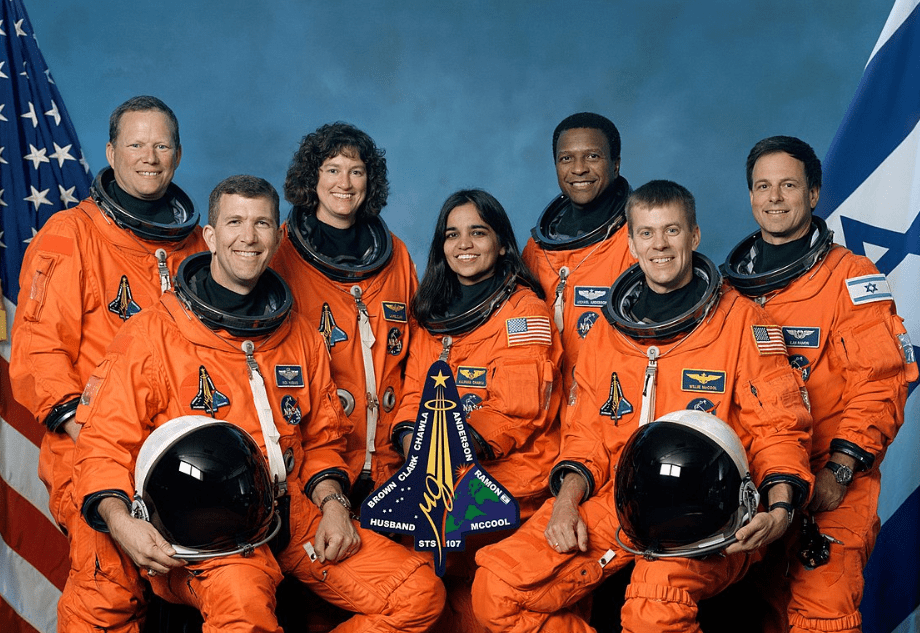
When NASA’s Columbia shuttle launched on January 16, 2003, it carried a crew of seven astronauts who’d spent almost three years getting to know each other before venturing on a 16-day science mission into space. NASA selected astronauts David Brown, Michael Anderson, Laurel Clark, Kalpana Chawla, Rick Husband and William McCool, as well as Iilan Ramon of the Israeli Space Agency for the mission in July 2000.
During the day, the crew trained together, working on the solidarity that would help them as a team. After work, the crew members and their families would gather for cookouts and laser tag at one another’s homes. The STS-107 mission crew included two women and five men of diverse religions, backgrounds, hobbies and interests. However, instead of letting the differences divide them, the trainees came together and encouraged each other, said Laura Husband, daughter of STS-107 Commander Rick Husband. She told CNN, “I grew up seeing this beautiful picture of all these different perspectives, and they loved each other and worked well together.”
Before the launch, the crew went on an outdoor team-building trip in Wyoming. As the shuttle commander, Rick thought it would help the team bond. Laura said, “I watched my dad really build a team, and he did that with our family, too. He was a good leader and a good team player.” After launching to space, the crew split into two teams to conduct dozens of round-the-clock experiments and gather valuable science data while taking time to exchange emails and enjoy a couple of video calls with their families.
When Columbia reentered Earth’s atmosphere on February 1, 2003, the shuttle broke apart over Texas as a result of damage from a foam strike on the shuttle’s left wing after liftoff, and the crew was tragically lost. Now, more than two decades after the loss of the Columbia astronauts, their family members continue to honor the memories and legacies of their loved ones. Rick Husband and his future wife, Evelyn, grew up a mile down the road from one another in Amarillo, Texas. They went to the same high school, but they didn’t begin dating until after running into each other in college during a basketball game at Texas Tech University.
Their first date was on January 28, 1977, and right away, Rick knocked over a glass of water and bumped his head on a light, trying to clean up the mess. Soon after, he told Evelyn he wanted to be a Dallas Cowboys football player or an astronaut, but he didn’t think being a football player was realistic, which made her laugh. Rick had worked toward the goal of becoming an astronaut since he was 4 years old. The two married after college, focusing on growing their faith together. Rick was incredibly humble, Evelyn said. When people asked about his job, he simply said he worked for NASA and would only admit to being an astronaut after further questioning, she said.
For Rick, faith came first, family second, and his job was third, Evelyn said. Faith helped Evelyn and Rick navigate rough patches in their marriage, she said. When Rick entered a quarantine to prevent crew members from getting sick before launch, he told Evelyn, “I feel like we’re in the best place we’ve ever been in our marriage,” she recalled. And she told him she felt the same way.
From space, Rick and his family shared a video call on January 28, 2003, and Rick wished Evelyn a “happy dating anniversary.” It was the last time they ever spoke. Evelyn and Laura relied on their faith to navigate their grief after the disaster, and they felt like God protected them through some of the worst days, they said. Eight months after her loss, Evelyn read the accident investigation report that was released. She remembers struggling with her anger, realizing that NASA knew the foam strike may have caused an issue and that maybe something could have been done to save the crew. She prayed that she wouldn’t be bitter.
Evelyn has since attended seminars hosted by NASA to remember the Columbia tragedy and share lessons learned so that history never repeats itself.
